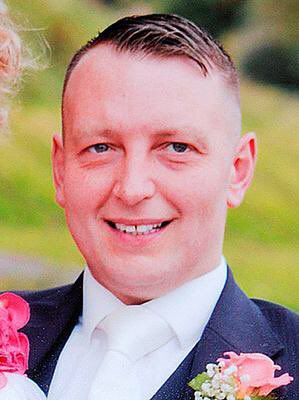A coroner has ruled that a police restraint that contributed to the death of man in the city centre was “not excessive”.
36-year-old Short Strand man Gerard McMahon died on the 8th September 2016 following an altercation involving the PSNI.
Officers were called to the scene after reports of a violent incident near the Europa Hotel. An inquest into the death heard that police had used CS spray on Mr McMahon and put him in the prone position with limb restraints on his legs.
Delivering his findings at the inquest on Friday, Coroner Joseph McCrisken found that Mr McMahon had taken cocaine leading to an Acute Behavioural Disturbance (ABD).
He said the force used during the restraint was “justified”, but that police must be better trained in restraint techniques.
Mr McCrisken found that the poor technique used represented a joint failure by the officers involved and the PSNI.
“I am satisfied that PSP training included elements concerning the importance of communication,” he said.
“I am, however, not satisfied that the officers were properly trained in the importance of having a ‘control’ or ‘restraint’ officer.
“This officer should ideally be the one closest to the detained person's head and more able to monitor their condition.
“This complete breakdown in any command structure led to the officers becoming engaged in a restraint with no single officer in command and, in my view, no 'end game' as to how the restraint might end.”
Mr McCrisken also said the use of CS Spray at close quarters during the incident was not justified.
“While the restraint on the ground was extremely poor, I am satisfied that the officers were justified in using a degree of force to restrain Mr McMahon,” he stated
In his conclusions, Mr McCrisken said: “It is possible that he would have survived without the restraint but the restraint did occur and in my opinion this, in combination with the ABD, caused a cardiac arrest leading ultimately to Mr McMahon's death.
“The answer to the question – Would Mr McMahon have died without the restraint? – is, maybe.”
In a statement released after the inquest verdict, solicitor for the McMahon family, Pádraig Ó Muirigh stated: “These findings are very detailed and the McMahon family will digest its contents over the next few days. However, it is clear that the Coroner has identified multiple failings by police in this case, in particular, in relation to the standard of training of police officers.
“The findings also outline the role the police restraint played in the death of Mr McMahon. “When police came into contact with Gerard McMahon on the 8th September 2016 in Belfast city centre, he was a very vulnerable and unwell man suffering from an Acute Behavioural Disturbance (ABD). He should have been treated as a medical emergency rather than a violent threat to the police officers and the public.”
He continued: “According to the findings of the Coroner it is possible that Mr McMahon would have survived without the restraint and in his opinion the restraint, in combination with the ABD, caused a cardiac arrest leading ultimately to Mr McMahon’s death.
“This case is a paradigm example of how policing in these circumstances should not be done.
The McMahon family and the wider public deserve a police service that can de-escalate situations such as this one with good communication and safe procedures, which take into account the well-being of the person and the officers and without resorting to dangerous restraint techniques.
“Whilst it is acknowledged that training of police officers has improved since 2016 there is a stark choice for the PSNI in light of these findings. It must invest in proper training and regular refresher training for police officers, the price is too high if they don’t.
“Hopefully, lessons will be learnt from this inquest. It will not bring Gerard McMahon back but perhaps it will shine a light on dangerous police practices and contribute to better public safety outcomes that prevent a recurrence of the suffering endured by the McMahon family.”








